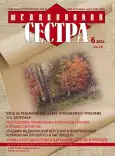Forensic medical expertise and law enforcement practice in case of errors in the work of nursing staff
- Authors: Dzhulay G.S.1, Bibikova A.A.1, Efremov I.S.2
-
Affiliations:
- Tver SMU МОН Russia
- TyumSMU МОН Russia
- Issue: Vol 26, No 6 (2024)
- Pages: 46-49
- Section: Nursing service in the healthcare system
- URL: https://journals.eco-vector.com/0025-8342/article/view/636338
- DOI: https://doi.org/10.29296/25879979-2024-06-10
- ID: 636338
Cite item
Abstract
The article is devoted to the activity of forensic medical expertise to ensure the validity, legality and fairness of decisions on the legal responsibility of medical workers taken by law enforcement authorities. The analysis of a specific clinical case, in which the commission forensic medical examination established a direct causal relationship between the onset of adverse consequences and the actions of a nursing medical worker, is carried out.
Full Text
About the authors
Galina S. Dzhulay
Tver SMU МОН Russia
Author for correspondence.
Email: djoulai@mail.ru
ORCID iD: 0000-0002-7687-8157
Doctor of Medical Sciences, Professor, Head of the Department of Departmental Therapy
Russian Federation, TverAnna A. Bibikova
Tver SMU МОН Russia
Email: bibikovaaa@mail.ru
ORCID iD: 0000-0002-4130-2756
Candidate of Medical Sciences, Associate Professor, Department of Anatomy, Histology and Embryology; Expert (Based in Tver) of the Forensic Medical Research Department of the North-West Branch of the Forensic Expert Centre of the Investigative Committee of the Russian Federation, Senior Lieutenant of Justice
Russian Federation, TverIgor S. Efremov
TyumSMU МОН Russia
Email: efremus-is@yandex.ru
ORCID iD: 0000-0001-9133-736X
Candidate of Medical Sciences, Assistant, Department of Anatomy, Histology and Embryology; Expert (Based in Tyumen) of the Forensic Medical Research Department of the North-West Branch of the Forensic Expert Centre of the Investigative Committee of the Russian Federation, Senior Lieutenant of Justice
Russian Federation, TyumenReferences
- Kozlov S.V. Medical accident. Problems of law enforcement activity. 2013; 2: 13–17.
- Shimanskaya S.V. Causal connection as a condition of civil liability in the implementation of medical activity. Meditsinskoye pravo. 2010; 4: 32–36.
- Erofeev S.V., Edelev N.S., Malakhov N.V. et al. Problem of expert assessment of unfavourable outcome of medical care: monitoring, development and current state. Forensic Medicine. Science. Practice. Education. 2017; 3 (1): 4–8.
- Gromov M.I., Fedorov A.V., Mikhalchuk M.A. et al. Hyperkalemia of emergency conditions: recommendations for diagnosis and treatment. Emergency Medical Care. 2015; 16 (2): 38–43.
- Whittaker C.F., Miklich M.A., Patel R.S. et al. Medication Safety Principles and Practice in CKD. Clin J Am Soc Nephrol. 2018; 13 (11): 1738–1746. doi: 10.2215/CJN.00580118
- Schaefer T.J., Wolford R.W. Disorders of potassium. Emerg Med Clin North Am. 2005; 23 (3): 723–747. doi: 10.1016/j.emc.2005.03.016
- Zull D.N. Disorders of potassium metabolism. Emerg Med Clin North Am. 1989; 7 (4): 771–794.
- Leonova M.V. Drug-induced arrhythmias. Medical Council. 2020; 21: 26–40. DOI: 10.21518/ 2079-701X-2020-21-26-40
Supplementary files






